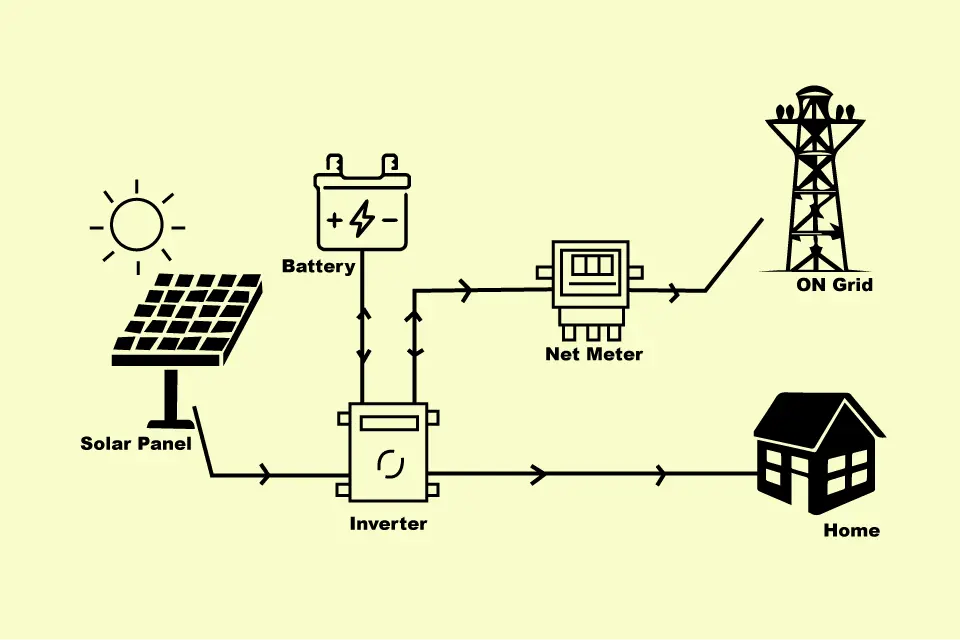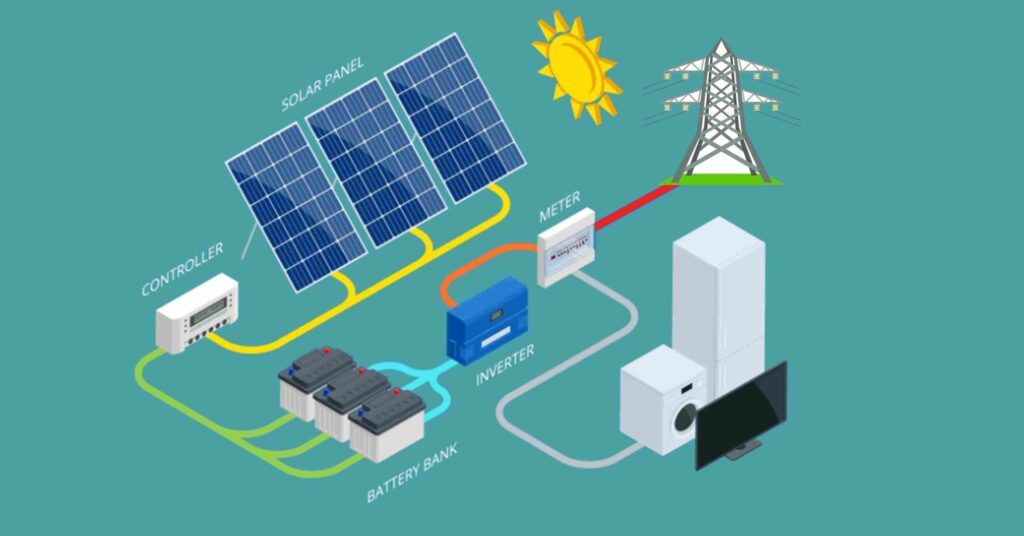................................
Hybrid- Grid Solar Plant
................................

Hybrid Solar System
A hybrid solar plant combines solar photovoltaic (PV) technology with other energy sources like wind or diesel generators to create a more reliable and efficient power supply. By diversifying energy sources, these plants enhance energy security and stability, especially in remote areas with limited grid connectivity. Advanced control systems optimize energy utilization based on factors like weather conditions and energy demand. Hybrid solar plants offer sustainable and cost-effective solutions for powering communities, industries, and critical infrastructure while reducing greenhouse gas emissions and combating climate change.


What is a hybrid solar system?
A solar power system that combines solar panels, a hybrid inverter, and a battery bank is known as a hybrid solar system. The batteries store energy for later use as the solar panels transform sunshine into electricity.
With the ability to operate both on and off the grid, hybrid systems let you continue using solar electricity even when the grid is down.

How does a hybrid solar system work?
A solar hybrid system is a renewable energy system that produces clean energy for your home using solar photovoltaic (PV) panels. A hybrid solar system intelligently alternates between drawing power from the grid, batteries, and the sun. You can avoid using grid power during peak hours, saving money on your bills.
The system stores the renewable energy generated by its solar panels on the roof. The system automatically switches on and powers all of your home’s critical loads during a storm or power loss, maintaining the operation of your refrigerator, lights, and phones and iPads.
................................
How Hybrid solar plant is better than On-grid and Off-grid Solar Plant
................................
Enhanced Reliability:
Hybrid Solar Plant
- Hybrid Solar Plant: By incorporating battery storage, hybrid systems provide backup power during grid outages, offering a level of reliability similar to off-grid systems. This backup capability ensures continuous power supply even when the grid is down, enhancing energy security.
On-Grid Solar Plant
- On-grid Solar Plant: While connected to the main electricity grid, on-grid systems do not typically provide backup power during grid outages unless coupled with backup generators or battery storage systems.
Off-Grid Solar Plant
- Off-grid Solar Plant: Offers independence from the main electricity grid but relies solely on battery storage for backup power. If the batteries degrade or fail, the reliability of the system may be compromised.
Optimized Energy Management:
Hybrid Solar Plant
- Hybrid Solar Plant: Allows for optimized energy management by intelligently balancing solar generation, battery storage, and grid electricity usage. This flexibility enables users to minimize energy costs by leveraging solar power when available and accessing the grid or stored energy during periods of low solar generation.
On-Grid Solar Plant
- On-grid Solar Plant: Relies primarily on grid electricity when solar generation is insufficient, which may result in higher energy costs, especially during peak demand periods or when grid electricity prices are high.
Off-Grid Solar Plant
- Off-grid Solar Plant: Solely dependent on solar generation and battery storage, off-grid systems may experience energy shortages during extended periods of low sunlight or high energy demand, requiring careful energy management.
Cost Efficiency:
Hybrid Solar Plant
- Hybrid Solar Plant: While the initial investment for hybrid systems may be higher due to the inclusion of battery storage, they can offer long-term cost savings by reducing reliance on grid electricity and minimizing peak demand charges. Additionally, hybrid systems may qualify for incentives or subsidies for incorporating energy storage technology.
On-Grid Solar Plant
- On-grid Solar Plant: Typically offers lower upfront costs compared to hybrid systems since they do not require battery storage. However, ongoing electricity bills and potential grid connection fees may increase the overall cost over time.
Off-Grid Solar Plant
- Off-grid Solar Plant: Can be cost-effective in remote areas where extending the grid infrastructure is expensive. However, the need for battery storage increases upfront costs, and ongoing maintenance may incur additional expenses.
.........................
The benefits of a hybrid solar system
..........................
A hybrid solar system is an excellent choice if your primary concern is maintaining backup power during outages or if your utility company imposes time-of-use rates, demand fees, or lacks a net metering policy where you’re compensated for surplus energy sent back to the grid. This system offers the flexibility to manage time-of-use electricity tariffs effectively, maximizing solar savings on monthly power bills.

Cost-Effectiveness
With a hybrid solar system, you have the opportunity to secure low energy prices for the long term, shielding yourself from potential rate hikes. This system empowers you to manage electricity expenses according to time-of-use, ensuring maximum savings on your solar bills.

Flexibility and Scalability
A hybrid system offers scalability to accommodate future energy demands and can be customized to suit the specific needs of a household. For example, if a customer requires a backup power source for essential loads such as computers, lights, televisions, refrigerators, and medical equipment, the battery bank would be utilized accordingly and sized to meet these critical load requirements. Unlike other types of PV systems, a hybrid PV system provides unmatched flexibility and scalability, ensuring tailored solutions for diverse energy needs.

Environmental Sustainability
The rising interest in reducing carbon footprints has led to increasing popularity of solar panels. For those seeking to make an environmental contribution, opting for a hybrid solar system is an excellent decision.
.........................
Conclusion
..........................
In summary, homeowners looking to transition to solar energy for cost savings and ensure uninterrupted power supply during outages will find a hybrid solar system to be an excellent option. If you’re considering implementing a hybrid solar solution, you can trust us to provide reliable assistance and expertise throughout the process.

